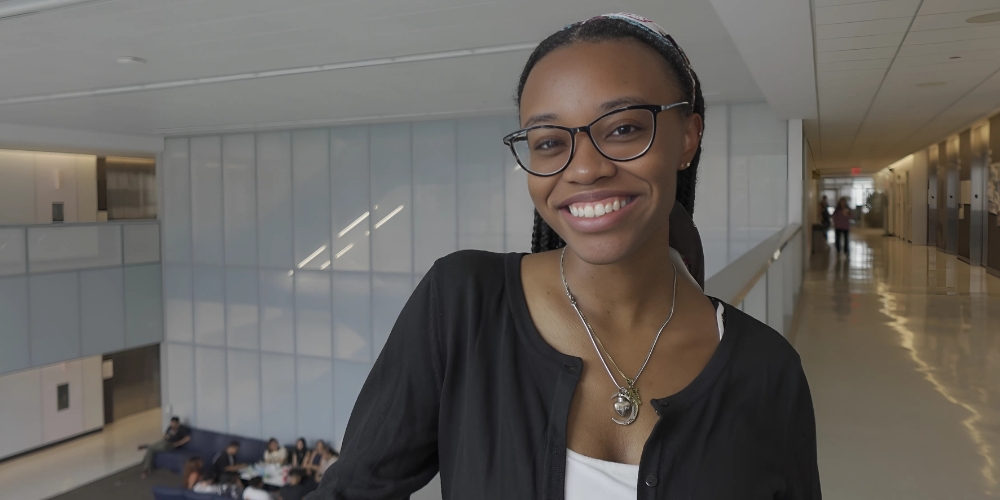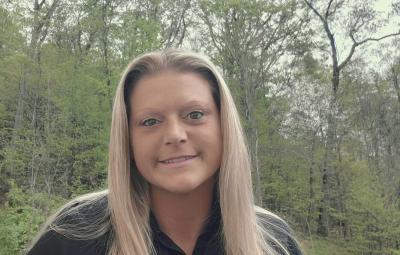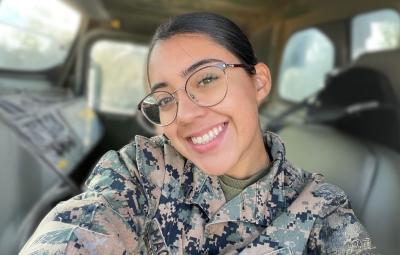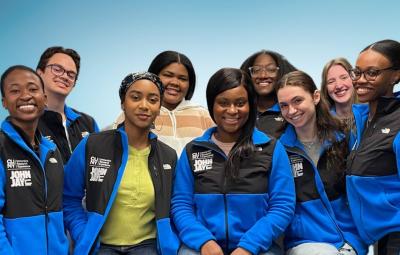
Major: B.A. in Forensic Psychology
Minor: Counseling
Mentors: Peggilee Wupperman, Ph.D., Ernest Lee, Ph.D.
Programs: CUNY Immersive Research Experience (CIRE), Ronald E. McNair Scholars Program, AppleCorps, Student Academic Success Program (SASP) Peer Coaches
Internships/Fellowships: Rikers Public Memory Project; ATD Fourth World; New York Giants Touchdown Fellowship
Hometown: Bronx, NY
Career Aspiration: Psychologist
What was life like before John Jay?
I grew up watching my parents work toward and earn their master’s degrees. They balanced studying and writing papers while working full-time jobs and raising a family. Seeing their drive and passion for education instilled in me a determination to succeed academically. They’re my biggest motivation when it comes to schooling.
Why John Jay?
You could say I was destined to come to John Jay. My mom graduated from the College with her bachelor’s degree in criminal justice while she was pregnant with me. Both my parents are proud CUNY graduates and work for CUNY, so I knew I wanted to come to a CUNY. But it was John Jay’s reputation, its student-centered services, and forensic psychology program that drew me to the College.
What sparked your passion for psychology?
I’m big on dismantling misconceptions and myths around mental health issues and have always been driven to advocate for people who are struggling. Beyond that, I remember watching Law & Order: Special Victims Unit and being fascinated by the character of Dr. George Huang, played by actor B.D. Wong. He was a psychiatrist with such a relaxing presence. Dr. Huang would come into scenes, often super tense situations, and calm everyone down. Seeing his approach made me see that psychology is interesting and can be helpful. That’s when my interest in the field was sparked.
How has your mentor put you on the path to success?
Dr. Wupperman has been amazing throughout my academic journey. When I first joined the McNair Program, Dr. Lee suggested I find a mentor who would support my research goals and help me adapt to the McNair environment. I reached out to Dr. Wupperman and she quickly responded to my request for mentorship. She got the ball rolling on the research process and ensured I had everything I needed. Now, we meet regularly, she provides me with feedback, and she helps prep me to effectively present research at conferences. One of the biggest challenges when you’re sharing research is breaking it down in a way so that different audiences can understand what you’re sharing. Dr. Wupperman has helped me understand that. She’s also helped me with my personal statements for grad school.
What are you researching with Dr. Wupperman?
We’re currently researching the impact of mindfulness on dysregulated behaviors—that's usually self-destructive, impulsive, or addictive behaviors. Specifically, we’re looking at a group of about 100 college students and conducting a survey. We’re having them rate how frequently they engage in certain behaviors and/or interact with mindfulness practices.
How have McNair, Apple Corps, and SASP enhanced your experience?
McNair has created the roadmap for me to earn my Ph.D. I’ve been able to conduct meaningful research, present at conferences and symposiums, and attend intensive workshops and info sessions focused on getting me into grad school. Apple Corps and SASP have strengthened my voice. I’m the lead Apple Corps Peer Success Coach, and in this role, I help my peers do well throughout their college career. These programs have given me effective leadership strategies that I know I can apply throughout my professional career.
What were your internship and fellowship experiences like?
I’ve been fortunate to have been part of a number of internships and fellowships. With the New York Touchdown Fellowship, I worked with the Brooklyn Justice Initiative’s Center for Justice Innovation as a community engagement specialist. Part of my work was with the “project reset” program, where I performed outreach calls and worked to help people who had a desk appearance ticket avoid getting a criminal record. If the D.A. approved their case and they qualified for the program, we would do the research so that their record could be sealed, and they could progress with their life.
At ATD Fourth, I was a project intern working specifically with underserved and low-income communities. ATD Fourth’s goal is to eradicate poverty, and part of my job was to help put on educational community events in the Brownsville section of Brooklyn. Our mission was to create community, promote opportunities for social mobility, and give community members access to resources that would help them out of poverty.
As an intern for the Rikers Public Memory Project, I worked extensively on social media to help advance the project’s visibility. I also did some digital storytelling, highlighting the experience of anyone who had previously been in Rikers and explaining why closing Rikers was necessary.
What’s it been like being part of the CIRE inaugural cohort?
Being a CIRE scholar has allowed me to fully immerse myself in research. At first, I was a bit worried because it’s 400 hours of required research over the course of a year, but it’s such a gift to be able to do this kind of in-depth work and broaden my understanding of the psychology field. I get to work closely with my mentor Dr. Wupperman and grow as a researcher. In addition to the professional development I’m gaining, my CIRE experience is further enhanced by meeting and talking with other CIRE scholars in different disciplines. It’s wonderful to brainstorm ideas and share our experiences within a vast array of research.
What do you want students, faculty, and stakeholders to know about CIRE?
The CIRE program is an amazing opportunity for students from underrepresented communities to create a pathway toward their post-graduate dreams. We need CIRE to make the most of our research experiences and become a driving force for change in our fields. As a John Jay student and CIRE scholar, it’s an incredible feeling knowing that I have the proper support in place to develop as a researcher, produce innovative work, and establish a community.
Where do you see yourself in 10 years?
I see myself having a Ph.D., being a practicing psychologist, and opening up a nonprofit where I can work in communities to dismantle the myths and stigma surrounding mental health. I’d also like to be an industrial/organizational psychologist, working with Human Resources departments to help improve workplace strategies and remove workplace bias and discrimination. Most of all, I want to give back to the CUNY community, serving students as a mentor, maybe even a teacher, and encouraging people to put their mental health first.



